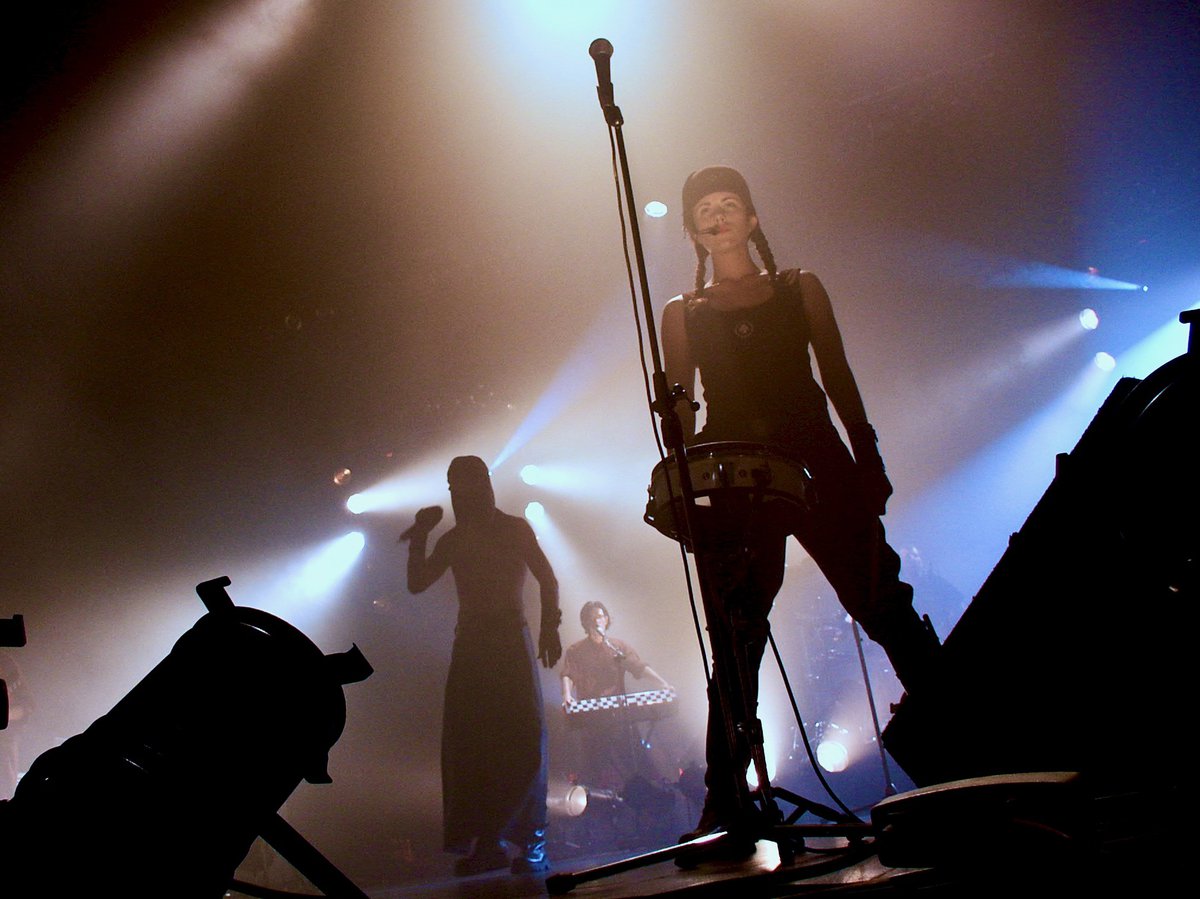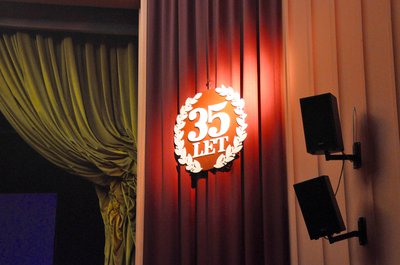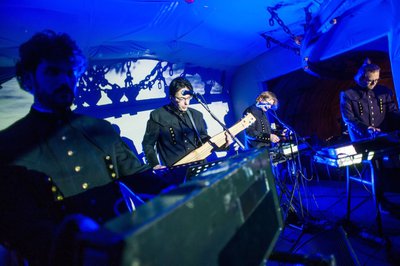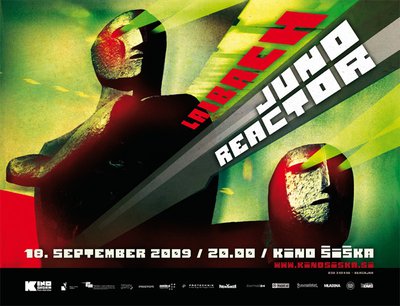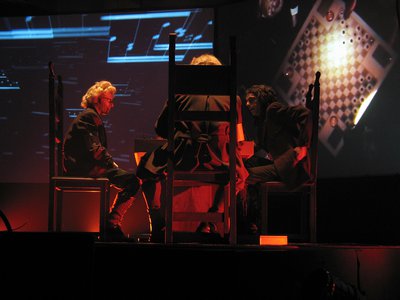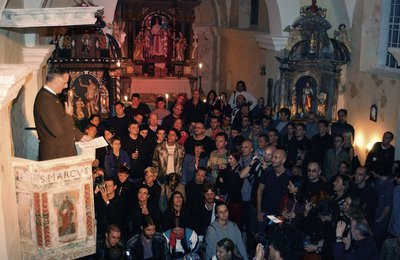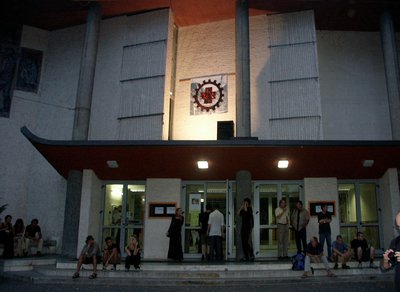Review of LAIBACH's WAT-Premiere Concert in Trbovlje on 24.07.2003
On 24.07.2003, LAIBACH presented for the first time their new program "WAT" in Delavski Dom in Trbovlje to a selected audience of approximately 600 people, among them NSK-members, -collaborators, -supporters and -fans as well as personally invited people from Trbovlje, family members and reporters of the media, press and TV.
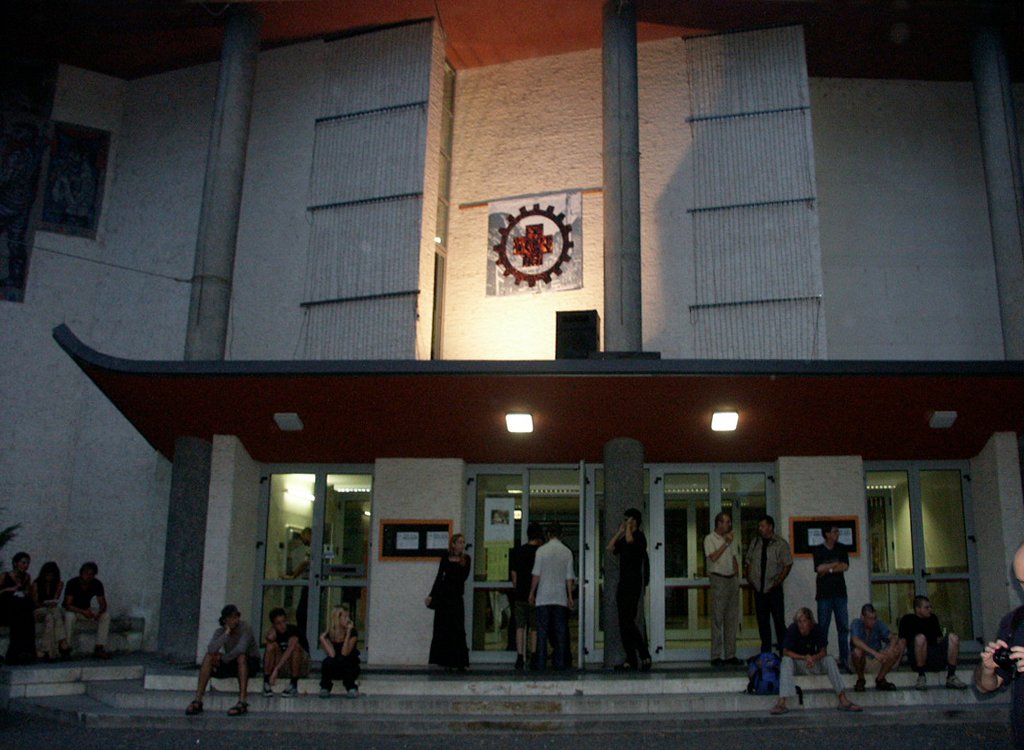
For us (mainly members of LAIBACH-NSK-newsgroup and NSKSTATE.COM from all over Europe, who had partly already been covering a few thousand kilometres only to get to Ljubljana) the event started in the early evening of 24.07.2003 at 18:30h with a 60 km bus-tour from Ljubljana to Trbovlje.
Once we arrived there, we were given a guided tour around the Trbovlje-Area to see points of LAIBACH-connected historical and cultural interest like the power plant (with its over 360m high chimney the highest in Europe), the cement-factory and the worker's quarters in the "Rdeci revirji" (The "Red Districts") of the old coalmining town. Explanations about these places and historical background-information were given by our guide, questions were answered and -not to forget- the tickets for the forthcoming show were handed out to us. After about 40 minutes the tour came to an end in front of Delavski Dom (The Hall of the Workers), which is a multifunctional complex for theatre, cinema and conferences, etc. in the centre of Trbovlje at 20:00h.

The space in front Delvaski Dom then was already conquered by a few LAIBACH-fans, and the banner with the well-known LAIBACH-symbol in black, white and bright red above the main entrance of the hall already gave an impression of what was already up to happen here later at night. Before the doors finally opened, people where entertained by a traditional "Spielmannszug" (minstrel-group) of local coalmining-workers performing historical marches and worker's songs in historical instrumentation and traditional costumes. This might be seen either as some kind of LAIBACH referring to the local history and cultural background of their hometown or as some sort of organized "Clash of Cultures" with a direct combination of traditional local arts with transnational (retro-) avantgarde. Although most of the attendants seemed to have some difficulty in figuring out what this musical interlude was meant to be, the group was given a fair applause for their performance.

The next visible reference to LAIBACHs connections to their past in their hometown Trbovlje was the appearance of a similar traditionally dressed coalmining costume-group in all-black traditional coalminer's clothings which then took over responsibility for security and entrance controls. As one of them I later spoke to put it: "We support LAIBACH. If there is anything coming from our town Trbovlje and becoming famous all over the world, we support that. In earlier times, it was the industrial production that Trbovlje was famous for. If we now export culture in form of LAIBACH to other countries around the globe, then we support that by our duty here, and we are proud of that.". In my eyes this was an impressing statement for the collaboration between LAIBACH and the local social institutions in their home-area after all the difficulties they had been suffering there -system conditional- during the early 80ies. Another sign for this collaboration and connection in a less human but more material way was for me the list of sponsors of the event which could be found on the tickets: among them there was not one foreign national or international enterprise but only local institutions like for example Radio Trbovlje, the local power plant and even the cement factory (!). Maybe this shows an increasing interest and support for the group in their homebase-area after they had been -in the last few years- much more successful in various different parts of the world than they had been where their roots are.

After the front-doors had finally opened at 21:15h, we found ourselves in the large entrance hall on the 1st floor for a welcome. The hall was also adorned with LAIBACH-logos above all the doors leading to the main auditorium what reminded in some way of the institutional and bureaucratic images of NSKs architect-department, the "Builders" or the early LAIBACH/NK-works like for example in the artwork of the record "Recapitulacija 1980-84". But with these logos it was not yet enough for NSK with propagandistic elements: The guests were welcomed with red and white "WAT"-wine out of especially labelled bottles showing the "WAT"-logo and handmade cookies in suprematist and industrial "Malevich-cross" and "Zahnrad"(toothed wheel)-design. That was in fact "Warenaesthetik" (aesthical values imployed in normal/everydaylife things) at its best...

While eating, drinking and discussing with old and new friends in the hall, people had already the possibility to get in personal contact with NSK-members Ivan Novak (LAIBACH) and Peter Mlakar (Department of Pure and Practical Philosophy of NSK) which were seen among the guests in their typical outfits shaking hands here and there and obviously sharing some good discussions with their guests.
At 22:00h, the main auditorium was finally opened and people gained their seats in the hall. Left and right from the stage -which was still hidden behind the closed curtain- were mounted large banners with the LAIBACH-logo in silver on dark blue in front of the red background of the curtain and stage-surroundings, creating the LAIBACH-typical official/statelike atmosphere.
After some minutes of a merely noticeable background-sound as some kind of intro (similar to the heartbeat-sounds of the "Occupied Europe NATO Tour"), a voice from the speakers welcomed the audience in a kind of polite and robotic kraftwerkian style. After this spoken greetings, the curtain opened to the beginning sounds of WAT's opening-track "B:Machina" and LAIBACH got on stage.

From the first sight, it became clear, that this was once again the essential original audio-visual LAIBACH-concept that they had been famous for many years, although some slight changes in details should reveal soon...
Anyway, the original optical and aesthetical stage-concept of LAIBACH in general was kept: Stage-setting turned out to have drums and keyboard (in "WAT"-black/white square-design) all in the back of the stage, and in front of that and partly moved further out to the sides guitars and bass. Finally, on the front edge of stage, Milan as singer and charismatical spokesman surrounded by the already well-known additional drums for an increase of rhythm-power and aesthetical reasons in a manner of IRWIN's element of the "little drummer" as a symbol for political propaganda.
But: The great (and in my eyes absolutely positive) surprise for all of us appeared, when these instrumental stage-sections were taken over by the group: In fact, Milan was singing, but the well-known part of additional drumming and background singing on the front-edge of the stage was -instead of as usual by Dejan and Ervin- taken over by two powerful, charming, and icecold-sexy girls in LAIBACH-uniforms!

As for the uniforms: After the slight "normalization" of their appearance during the "Occupied Europe NATO Tour" and "Jesus Christ Superstars", LAIBACH seem to go back to the roots in this point with the men dressed in black boots and old-style military uniforms with a small LAIBACH-logo on the front and Milan with his already well-known skirtlike dress and head-gear. Similar to that, the two girls were dressed up in boots and traditional uniforms as well but here combined with black LAIBACH-muscle shirts, large leather-wristlets and the grey traditional eastern head-gear witch LAIBACH-logo which actually also appears on the cover of the forthcoming "Tanz mit LAIBACH"-single. Altogether -and this was the opinion of everybody in the audience I later could talk to- this made a perfect variation of the traditional LAIBACH-style with modern elements and in fact, concerning the aesthetical creation of a powerful and cold atmosphere, the two girls were not inferior to their male predecessors at all.
Generally, the uniforms with their historical fashion/shape on the one hand and their avantgardistic/futuristic color (black with a light red shining in different light) on the other hand once again might symbolize the timeless ambivalence and obvious contradiction between the technical and social progress of the 21st century and the rapid reversion into middle-ages-style barbarism on a global basis by the same time, with -for example- the Iraq-war as a (non-religious?) crusade in middle-age behaviour.
After "B-Machina" had more the character of some kind of an atmospheric/orchestral intro with background-choirs, samples and spoken words, the program went on with the more brutal and rhythm-based "Tanz mit LAIBACH", "Du bist unser" and "Achtung!".
The audiovisual tactics here once again proved to fit the concept of "WAT", by putting the LAIBACH-typical ambivalence between fear and fascination, caused by this unique mixture of a brutal/cold and by the same time powerful/emotional atmosphere into a modern context with a sophisticated sound, stage-performance and minimalistic lightshow (in general consisting of only blue and red light contrasted by bright symmetrical white lightbars and stroboscopic effects).

Speaking of the new LAIBACH-material in general, before getting to details of certain songs: It seems to me that the tracks we were hearing are some kind of reference to the past -overall history as well as the history of LAIBACH itself- and linking these references with the present and future as a strong symbol for the universality of time (which is according to LAIBACHs self-definition on "Recapitulacija 1980-84" an immanent and integral part of their original and unchangeable concept). Sticking to that concept, we witnessed a lot of quotations and parallels to previous LAIBACH-works, but this is not meant to be seen as a negative aspect, as it is -in my opinion- not based on a lack of ideas, but more on the fact that history repeats itself. And -in my eyes- this aspect of history repeating could not be symbolized better than in the way LAIBACH do this with WAT by picking up moments and elements of history and forcing people to reflect on the contemporary reappearance of these very same moments and elements just with another obviously visible face (for example the reappearance of totalitarism, once in a nazi/socialist/communist/military manner now in form of pure kapitalist totalitarian rule of borderless financial power).
This sort of mixture of former LAIBACH-works is also audible in the sound-structures of WAT: For me personally, the tracks unify elements of hard, minimalistic and non-melodic noises (like on Nova Akropola) with powerful and slightly aggressive singing (like in Opus Dei), sophisticated and modern techno/electro-sounds (like on NATO) and bombastic hymnical choirs (like on JCS) together to an absolutely functioning whole.
Thus, the sound is by the same time retrospective and timeless by combining different former elements into a new kind of sound which is in fact even more powerful than the original elements on their own could be today.
In this sense, the track "Tanz mit LAIBACH" seems to function as a cynical description of todays world without clear borders, rules or ethical standards between various sorts of social and political systems, religions, etc.
And again, LAIBACH themselves appear to be far out of these systems and values, taking out parts of whatever system they like and using it at their own will. As such for example, the line "Wir tanzen mit Faschismus und Roter Anarchie" is absolutely true considering on the one hand the history of LAIBACH, drawing parallels between the totalitarian Nazi-regime in Germany in the 1930ies and the totalitarian socialist Yugoslavia with the Opus Dei-album in 1987 and on the other hand the actual political situation with states and systems negating their own official values for reasons of pure power and the sake of the hidden reverse which -caused by this development- is getting more and more visible in the open. According to these circumstances, the controversial line "Americano-Freunde und deutscher Kamerad: Wir tanzen gut zusammen - Wir tanzen nach Baghdad!" should not be taken too seriously and literal. I think it should be seen as another symbol for this unpredictable breaking of old loyalties and forming of new (and sometimes strange) collaborations we are currently witnessing worldwide with not yet a clear long-term vision for the future, forcing us to dance with everything that might appear on the global stage.
"Achtung!" seems to be in some way referring to 1985's "Panorama" where the (utopian?) role of Yugoslavia as a free space between east and west during the cold war leads us today to the question, if Slovenia as a democratic state right in the midst of New Europe might (in a positive way) play the role of a mediator and crossroad between the still largely gapped Eastern and Western parts of Europe and the whole world in such difficult times as ours.
After these first four songs, the show continued with tracks "Ende", "Now you will pay" and "Hell-Symmetry".
While "Ende" appeared to be a minimalistic and merely melodic spoken-word-track with an apocalyptical vision of the final judgement, "Now you will pay" is –in my eyes- a perfect sarcastic song about the "Barbarians from the East", playing again with the West's old fears of the Communist Eastern Block and by the same time with the West/s new fears of Eastern/Arabic/Middle-East violence in form of international terrorism. As such it is again a reference to LAIBACHs past, when they first created this barbaric fantasy-image of the Balkan- and Eastern nations for their blinded and irritated Western audiences in their song and video-clip of "Sympathy for the Devil". And again this proves that history is repeating with a slightly changing face, as the Western system after the end of the cold war seems to be still in need of an abstract enemy to defend their values of freedom of the individual, and this enemy again seems to be found in the East.
With "Hell-Symmetry", LAIBACH then submerge even further into the philosophical deeps of the ambivalences they cause: That song seems to be the fictional "statement" of either some interior evil living in every soul or an abstract evil (which might be the "system") forced upon everybody from the outside which then takes control over that soul and using it for its own will no matter if you accept this power or not ("love me - love me not"). In the end of the lyrics, it is revealed that this certain evil is again nothing but the powerful ambivalence of LAIBACH, the world and every human being itself: "Welcome to the industry of seven deadly sins - Welcome to the universe of LAIBACHKUNST-machine!".
The show then moved towards its end with "Das Spiel ist aus", "Satanic Versus", "The Great Divide" and the powerful and atmospheric "WAT".
"Das Spiel ist aus" once again plays with various quotations from former LAIBACH-albums with lines like "Der Mensch lebt in hoechster Not - Der Mensch lebt in groesster Pein" or "Was entstanden ist, das muss vergehen - Was vergangen ist muss auferstehen" originally appearing in KAPITALs "The hunter's funeral procession (from the Wunderhorn-Trilogie)" and the repeating shouts of "Raus!" from Opus Dei's "Herzfelde". Similar to "Ende", this songs seems to me like a pre-apocalyptical statement of the final days with once again LAIBACH themselves standing outside this system: "Wir sind zeitlos - Und Du bist... tot!". Even more than the most retrospective song "WAT", these lyrics of "Das Spiel ist aus" will probably cause long and controversial discussions about the question if "WAT" might be the last LAIBACH-album, after with WAT they seem to have come to a full circle with their own and worldwide history repeating itself right before our eyes. Only the future will answer this question...
"WAT" itself is in fact some kind of pure self-reflecting of LAIBACH with symbolic references to former albums and leading to their conclusion/statement "We are time", once again referring to repetition of history and the ability of LAIBACH to stop and turn the wheel of time at their own will for their purposes of agitation. Speaking of references and influences to former LAIBACH-songs from the past, "WAT" as a whole parallels the spoken self-definition of LAIBACH on "Recapitulacija 1980-84" with its recorded version of the 10 items of the covenant.
With the final lyric-passages of "WAT" perfectly fitting ("...and when our beat stops, and the lights go out, and when we leave this place, you will be left here all alone with a static scream blocked on your face... we are time!"), the band left the stage under great applause of the audience but was soon to return and conclude the show with the extra-songs "Alle gegen Alle" (from NATO) and "Anti-semitism" (from WAT). After the band had then lastly and finally disappeared from stage, it was again like in the beginning of the concert, with a voice from the speakers thanking the audience for coming and inviting everybody for a drink and party on Mountain Kum.
The reactions of the audience to the concert were -as far as I can tell- absolutely positive with no exceptions. The statement to be heard most of the time that night was "Great album. Great show. LAIBACH is back!". I can personally only agree with that.
After leaving Delavski Dom, we arrived on top of Mountain Kum shortly after midnight. The scenery of the slightly illuminated old church in contrast to the glaring yellow highpower-spotlights of Kum-Radiotower right beside under the dark sky gave the greatest possible background for the aftershow-party to come.
The whole summit of Kum was sounded with chilling trance-, ambient- and technosounds performed by a DJ settled on the organ-choir in the small mediaeval church and people were dancing inside the church as well as outside under the stars. The innkeeper of the mountainhut's general room was offering large amounts of food and drinks to the guests, starting from bread and soup over grilled meat and fish to the already mentioned "WAT"-wine. In fact, nobody lacked anything on that party and people were just having a great time dancing, talking, eating, drinking, laughing and -not to forget- discussing "WAT".
Another attraction lasting for the whole night was the non-stop-presentation of the forthcoming video-clips of the WAT-album, projected to the sidewall of the general room with a video-beamer. Here could be seen -among many others- the brandnew video-clips of "Tanz mit Laibach" and "Now you will pay" which -hopefully- might be released on video or DVD sometime, as they seemed to be great visualisations for the songs.
In the meantime, the party was only once shortly paused for another official NSK-event, a philosophical speech delivered from the pulpit (!) in the atmospherical twilight of the curch's interior by Peter Mlakar. The speech (which was held in English due to the large amount of guests from all over the world) dealed -in an abstract philosophical manner- with the topic of life in itself, its connection to death, the meaning of life and the crosslinks between these parts of philosophy. According to Peter Mlakar, the speech will be published in written form soon.
Soon after 01:00h, LAIBACH arrived on Mountain Kum after a short time of deserved recreation after the concert and most of the attendants took the rare and exclusive opportunity to speak to members of the group personally for at least a few minutes in the comfortable atmosphere of the party and congratulate them for the great work done with "WAT".
After 4 hours of celebration with lots of old and new friends, music and drinks, the event ended for us at 04:00h in the morning with the beginning of dawn and the bus taking us back to Ljubljana after a great night. The only thing left to say is a great "HVALA/THANK YOU/VIELEN DANK" to LAIBACH and NSK for making this outstanding art-event possible and wishing them all the best for the forthcoming European tour and any other future projects to come. Let us hope they keep up their great work for the European art. Anyway: LAIBACH is back and seems to be in a perfect constitution for the 21st century.
LEBEN HEISST LEBEN!
